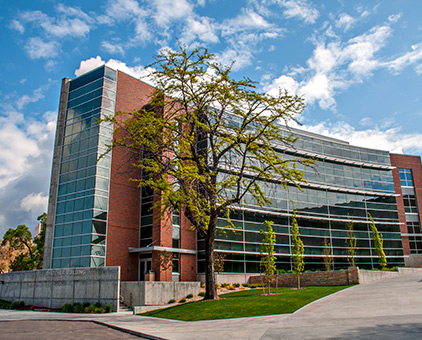Physics
Bennion
Center
Office of
Undergraduate Research
Courses
Getting Started
- Build your math skills in PHYS 1500, if applicable
- Take PHYS 1980 to learn about resources and opportunities
- Meet with your advisor to discuss your interests and plan your course path
Making Progress
- Meet with your advisor regularly
- PHYS 2710: Physics III: Modern Physics & Thermodynamics
- PHYS 3010: Physics IV: Intermediate Mechanics with Relativity
- PHYS 3980: Undergrad Seminar II
- Choose practical and advanced physics electives that align with your interests and emphasis area
Finishing Up
- Complete remaining physics/major courses and select advanced and practical electives to specialize your skills
- Review degree audit with your advisor and apply for graduation
- Apply for graduation
Community
Getting Started
- Participate in the PANDA Network
- Join a student group, such as Society of Physics Students or PASSAGE
- Interact with faculty after class or during office hours
Making Progress
- Apply to become a PANDA Mentor
- Run as an officer in SPS or PASSAGE
- Apply to be a College of Science Ambassador
- Explore student groups, look into community-engaged learning opportunities, and connect with campus organizations that align with your interests
Knowledge & Skills
Getting Started
- Learn Python and basic programming skills and how they relate to physics
- Build your introductory calculus and math fluency skills
- Explore opportunities and resources in PHYS 1980
Making Progress
- Add linear algebra and differential equations to your math skills
- Choose practical or advanced electives to explore your interests
- Organize study groups with your peers
- Begin research with a faculty member
- Apply for an internship to build your experience. Explore internship opportunities in the College of Science or by meeting with a Career Coach in the CPDC
Finishing Up
- Show your expertise by presenting at poster sessions, symposiums, or professional conferences
- Consider research opportunities through UROP
- Complete your Honors thesis, if applicable
Transformation
Getting Started
- Declare your major and explore emphasis areas
- Talk with your professors about career options
- Consider a learning abroad experience – complete Learning Abroad 101 to get started
Making Progress
- Declare your emphasis (if you haven’t already)
- Attend research symposiums or seminars to explore physics topics
- Participate in science outreach in the community
- Attend a workshop or training through the Counseling Center or Center for Student Wellness
- Visit the Natural History Museum of Utah or attend local events using your ArtsPass
- Ask your faculty for letters of recommendation
Finishing Up
- Present research projects at poster sessions, symposiums, or professional conferences
- Complete your Honors thesis, if applicable
Impact
Getting Started
- Join a student group on campus to find your people
- Volunteer at the Bennion Center
Making Progress
- Apply to become a Learning or Teaching Assistant to help other students
- Become a tutor with the Math Tutoring Center or Learning Center
- Participate in science outreach opportunities to interact with the community
- Become a PANDA Mentor for new students
- Apply to go on an Alternative Break in the fall/spring through the Bennion Center
Finishing Up
- Get involved in Undergrad Student Advisory Committee (USAC) to shape department policies and decisions
Careers
Getting Started
- Meet with a Career Coach to explore different career paths
- Activate your Handshake account to find jobs, internships, and career events
Making Progress
- Apply for internships or research opportunities to build your skills
- Do an informational interview with someone in your field of interest
- Begin exploring grad school opportunities
- Connect with alumni via the Alumni Association or ForeverUtah
- Update your resume and draft a cover letter
- Attend STEM Career Fairs and utilize CPDC resources to find internships and career opportunities
Finishing Up
- Attend STEM Career Fairs to find jobs
- Meet with a Career Coach to practice interviewing and negotiation skills and to polish your resume
- Apply for grad school
Start Your Career Journey
Find support at the Career and Professional Development Center (CPDC)
About the Major
Learning Outcomes
- Problem Solving: Physics students can (a) identify the essential physical principles underlying both idealized and real-world problems, (b) express problems in the language of mathematics, and (c) solve problems alone and in teams using a variety of tools including estimation, simplified models, computational methods, and graphical representations.
- Science Methods: Physics students can (a) articulate the role of observation and the interplay between experiment and theory in scientific progress, (b) collect and analyze experimental data, and (c) estimate and understand the statistical significance and confidence levels of an experimental result.
- Science Communication: students can present experimental results and complex physics principles in both written and oral formats with proper citations.
- Science and Society: Students are able to (a) apply physics concepts to contemporary systems and (b) recognize the contributions and value of diverse perspectives, backgrounds, and identities within physics and science.
Plan & Prepare
At the U, we plan for our students to have an exceptional Educational Experience identified by four broad categories we call the Learning Framework: Community, Knowledge & Skills, Transformation, and Impact. This major map will help you envision, explore, design, and plan your personalized Exceptional Education Experience with the Learning Framework at the core. In addition to assisting you in planning your coursework and navigating the requirements of your major, this map will help you incorporate other kinds of experiences to expand your knowledge, support your development, and prepare you for the future you want.


